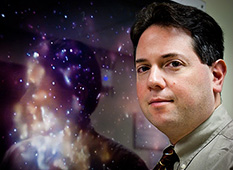Faculty Forum Online: Learn About the Strange New Worlds of Exoplanets
-
-
slice.mit.edu
- 4
Filed Under
Recommended

Update: Watch the Feb. 11 webcast.
The study of exoplanets can be portrayed as a single-minded quest for habitable, Earth-like planets. But the most remarkable discoveries have been exoplanets with unanticipated properties that can make habitation impossible.
In the Feb. 2014 Faculty Forum Online, Associate Professor Joshua Winn ’94, SM ’94, PhD ’01 described these new worlds—and shared research discoveries about the formation and evolution of planets.
Following his comments, Winn took questions from the worldwide MIT community via interactive chat. Watch the archived webcast then return to Slice of MIT and continue the conversation in the comments.
About Joshua Winn ’94, SM ’94, PhD ’01

Associate Professor Joshua Winn’s research explores the properties of planets around other stars, how planets form and evolve, and seeks to answer if there are other planets capable of supporting life.
His research group uses optical and infrared telescopes to study exoplanetary systems—particularly those in which the star and planet eclipse one another—and pursues topics in stellar astronomy, planetary dynamics, radio interferometry, gravitational lensing, and photonic band-gap materials.
Winn is the deputy science director of the Transiting Exoplanet Survey Satellite, a NASA mission scheduled for launch in 2017. He earned his bachelor’s degree, master’s degree, and doctorate for MIT and spent one year as a Fulbright Scholar at Cambridge University. He is a contributor to the science section of the Economist and held postdoctoral fellowships with the National Science Foundation and NASA. He joined the MIT Department of Physics in January 2006.
Related
“Searching for solar systems like our own,” MIT News, March 13, 2013 "Learning from Hot Jupiters," MIT News, December 15, 2010 MIT Department of Physics Faculty Profile: Joshua Winn
About Faculty Forum Online
Eight times per season, the Faculty Forum Online presents compelling interviews with faculty on timely and relevant topics. Viewers watch and participate in live 30-minute interviews via interactive chat. Since its inception in 2011, archival editions of these programs have been viewed more than 50,000 times.
For the 2013-2014 season, the Alumni Association will produce three public service-themed evening editions centered titled "One Community Together in Service."








Comments
Jay London
Tue, 02/04/2014 3:42pm
Hello Emil,
You should now be able to register by clicking on the link.
Thanks,
Jay
Emil M Friedman
Tue, 02/04/2014 1:17pm
The link ("Take part in the discussion") does not contain a link for registering.
Emil M Friedman
Tue, 02/04/2014 9:48pm
Thank you. (No need to post reply. Just saying thank you for the "registration button".)
editor-b
Tue, 02/04/2014 2:16pm
Then, perhaps, is there fossils or life elsewhere? But, isn’t the emergence and maintenance of life a process of radical contingency? That is, is a unique and unrepeatable past totally necessary? Or does life emerge through space like mushrooms when some conditions are present? So, how many conditions are necessary: three, four, trillions, infinite? Only one, water or any sort of God? Is God the word that means infinite conditions, absolute necessity? Anyway, how did the life that emerge in a given conditions resist when switching to a different moment? How does life resist time itself, the effects of entropy? But, is it possible for human beings to recognise a simpler life than their own brain only? On the other hand, beyond likeness, is it possible to recognise a complex life than their brain, is this the extra-terrestrial life that some people are searching unsuccessfully? However, is there an origin of life or would it be as finding a cut in the material history of the universe, an infinite void that human language patches now? Along these lines, there is a peculiar book, a short preview in http://goo.gl/rfVqw6 Just another suggestion, far away from dogmas or axioms.